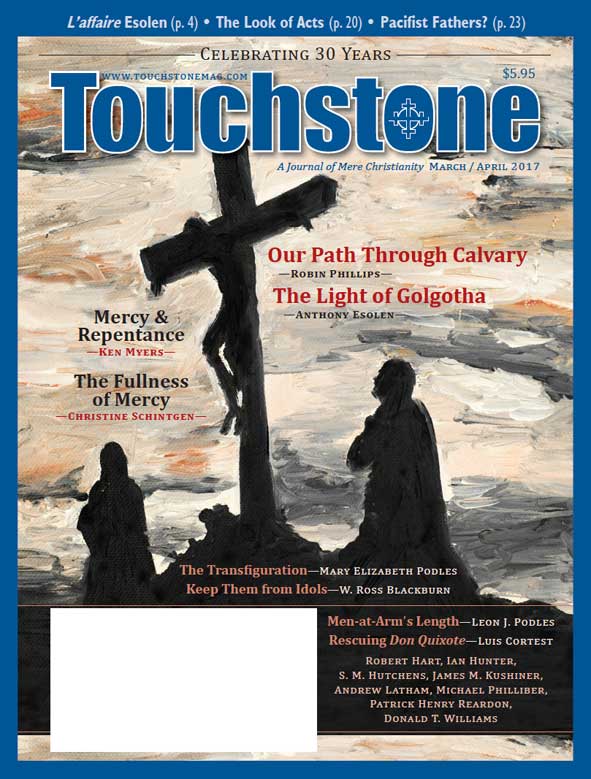Feature
Keep Them
from Idols
The Education of Children Takes Generations of Fidelity
Several years ago I was struck by the first sentence in Eric Metaxas' biography of Dietrich Bonhoeffer, a quote from Eberhard Bethge describing his lifelong friend: "The rich world of his ancestors set the standards for Dietrich Bonhoeffer's own life. It gave him a certainty of judgment and manner that cannot be acquired in a single generation." Given that "certainty of judgment and manner" are increasingly rare, even in the Church, there is something very arresting in Bethge's description of Bonhoeffer. Even more arresting, to my mind, is Bethge's claim that such character can only be forged over generations. Is this true? And if so, how is deep, lasting generational character forged?
The question of character became quickly apparent to my wife and me when our oldest son William was three years old. Having enrolled him in a morning preschool, and in some ways quite a good one, it wasn't long before we noticed a different attitude. William's sunniness was giving way to a contentiousness we had not known. Curious, and a bit troubled, I took a day off from work and accompanied William to school. Things became clear as I observed four-year-old Tommy and marveled at how precisely William had picked up not only Tommy's words and gestures, but also his attitudes. Without complaint to the school (and with best wishes for Tommy), we withdrew William that day, now committed to keeping him at home, at least for his early and most impressionable years. Years later, when William was about nine years old, from a distance I heard him singing hymns while swinging at our neighborhood park. Apparently he hadn't yet learned that you don't do that kind of thing in public.
The Scriptures understand that we are largely a product of our generations, and therefore put great weight on generational faithfulness, particularly passing on the knowledge of God to future generations. This is nowhere clearer than in the Shema of Deuteronomy 6:4–9, perhaps the best-known passage in the Old Testament. In a time when, to borrow Andy Crouch's phrase, the Church is hearing a renewed call to "culture making" as a way of faithfully living out her mission, it is remarkably underappreciated that the home is both the primary place where God intends his people to be formed and the chief means of forging the kind of cultural character that shines brightly in a dark world. With this in mind, we will look carefully at the Shema, exploring not only what it commands about family life, but also the contours of family life it assumes. The passage lays out what we might call a philosophy of education, giving Israel both the content and the context for forming her children, to the end that Israel would live well in the land, and be a faithful witness to the rest of the world.
The Content of the Commandment
The Shema begins as follows:
Hear, O Israel: The Lord our God, the Lord is one. You shall love the Lord your God with all your heart and with all your soul and with all your might. (Deut. 6:4-5)
After asserting the uniqueness of God, the Shema calls for Israel's exclusive love and worship, and that in every area of life, for "all your heart, all your soul, all your might" does not just suggest an intensity of love (be that as it may), but also the all-encompassing nature of love, which influences every area of life. Or, to say it differently, Israel's life is to be lived out in all areas as a practical response to God, who redeemed her and called her to himself. It had a bearing on, among other things, worship, one's economic life, one's sexual relationships, one's understanding of justice, and, as we shall see, the raising of one's children. Even the "success" of one's career was rooted in faithfulness: "you shall remember the Lord your God, for it is he who gives you power to get wealth, that he may confirm his covenant that he swore to your fathers, as it is this day" (Deut. 8:18). Nothing in Israel's life fell outside this command to love God, for all of life was an expression of this primary call.
The corollary to the Shema, the First Commandment, gives the negative side of this command, to reject completely any other gods:
You shall have no other gods before me. You shall not make for yourself a carved image, or any likeness of anything that is in heaven above, or that is on the earth beneath, or that is in the water under the earth. You shall not bow down to them or serve them; for I the Lord your God am a jealous God, visiting the iniquity of the fathers on the children to the third and fourth generation of those who hate me, but showing steadfast love to thousands of those who love me and keep my commandments (Deut. 5:7–10; cf. 7:8–11).
That loving God means rejecting other loves or allegiances, axiomatic in Deuteronomy, is reflected throughout the Scriptures. John puts the matter precisely: "Do not love the world or the things in the world. If anyone loves the world, the love of the Father is not in him. . . . And the world is passing away along with its desires, but whoever does the will of God abides forever" (1 John 2:15–17). James says it even more starkly: "whoever wishes to be a friend of the world makes himself an enemy of God" (James 4:4).
W. Ross Blackburn is the rector of Christ the King, an Anglican Fellowship in Boone, North Carolina. He also writes weekly reflections for the Human Life Review's website on matters of life.
subscription options
Order
Print/Online Subscription

Get six issues (one year) of Touchstone PLUS full online access including pdf downloads for only $39.95. That's only $3.34 per month!
Order
Online Only
Subscription

Get a one-year full-access subscription to the Touchstone online archives for only $19.95. That's only $1.66 per month!
bulk subscriptions
Order Touchstone subscriptions in bulk and save $10 per sub! Each subscription includes 6 issues of Touchstone plus full online access to touchstonemag.com—including archives, videos, and pdf downloads of recent issues for only $29.95 each! Great for churches or study groups.
Transactions will be processed on a secure server.
more on fatherhood from the online archives
more from the online archives

37.5—Sept/Oct 2024
Why Law Schools Can't Teach Law
A sidebar to How Law Lost Its Way by Adam MacLeod
calling all readers
Please Donate
"There are magazines worth reading but few worth saving . . . Touchstone is just such a magazine."
—Alice von Hildebrand
"Here we do not concede one square millimeter of territory to falsehood, folly, contemporary sentimentality, or fashion. We speak the truth, and let God be our judge. . . . Touchstone is the one committedly Christian conservative journal."
—Anthony Esolen, Touchstone senior editor













